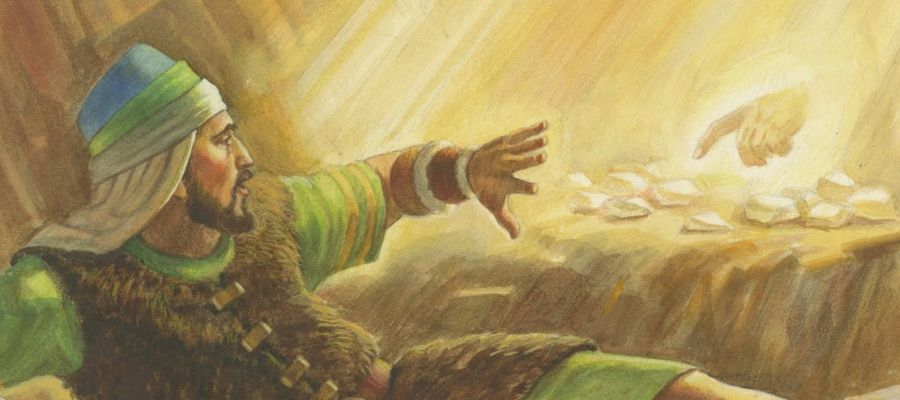To accompany your Come Follow Me study for the week of November 11-17
You may enjoy any or all of the following related videos:
You will enjoy consulting the commentary in the Book of Mormon Institute of Religion Student Manual at:
If you would like a Kahoot game related to this material which you could use for personal study or use with your family or your class, click here: https://create.kahoot.it/share/ether-1-5/c0863060-d280-487f-82c2-2da95b7cd5d0. To use it with a group, after clicking on this link, you will need to log into Kahoot, creating a free account if you have not done so previously, then click on the blue “Host Live” button or the gray “Assign” button, depending on how you wish to use the Kahoot. Some of the Kahoot questions may presuppose that the player has read through the suggested answers to the following Points to Ponder and at least has browsed the Institute student manual as well.
Points to Ponder in Ether 1-5
1. In what way is the very existence of the Book of Ether evidence that Joseph Smith didn’t just make up the Book of Mormon?
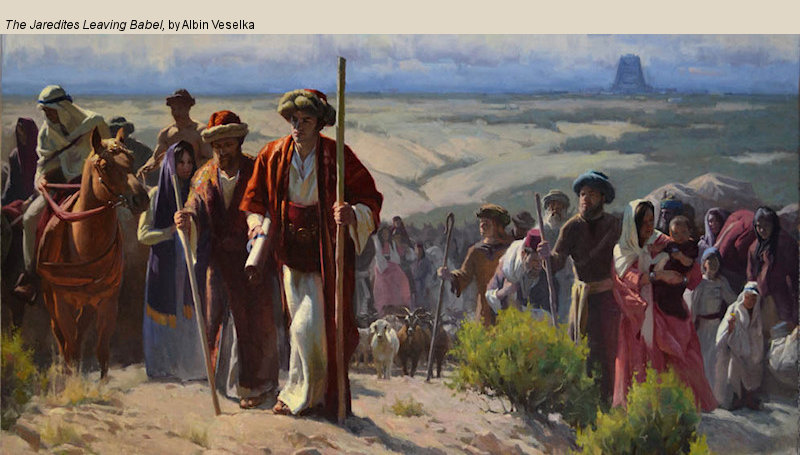
2. Why might we expect the Book of Ether to be in a demonstrably different literary style compared to the books of Mosiah through Mormon 6?
3. Ether 1-5 recounts several revelations given to a. Jared b. Moroni c. Ether d. Mahonri Moriancumr
4. For what possible reason would the Book of Mormon itself never mention the name of the brother of Jared, when he was quite obviously spiritually superior to Jared?
5. What was the reason the Lord gave the brother of Jared for which he would take him and his family and friends to a land choice above all others and make of them a great nation?
a. Because of their pre-mortal worthiness
b. Because of his persistence in prayer
c. Because of his exceedingly great faith
d. Because the Americas were empty and needed someone to settle in them
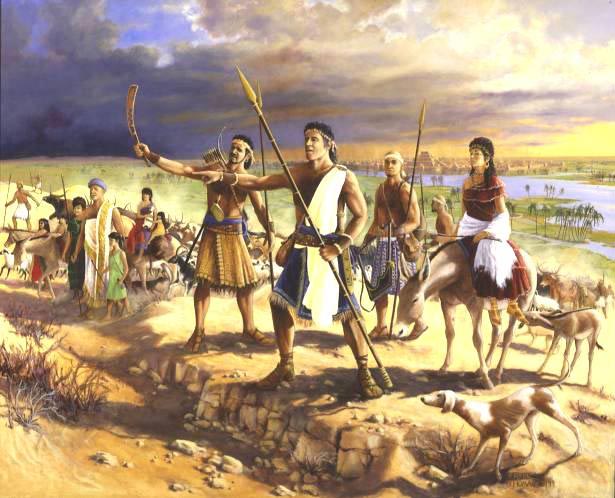
6. “Deseret” is a Jaredite word meaning
a. Honeybee
b. Industry
c. Beehive
d. A barren wilderness
e. A sweet course eaten at the end of a meal
f. A newspaper
7. The Lord chastised the brother of Jared for three hours because he had forgotten
a. To pray
b. To offer sacrifices
c. The twenty-four gold plates
d. To bring his wife
How would you summarize the lesson Jared probably hoped we would learn from this?
8. The Jaredite barges most closely resembled a
a. rowboat
b. sailboat
c. battleship
d. submarine
9. When the brother of Jared complained about the lack of light in the barges, the Lord said in effect:
a. Why didn’t you pay your light bill?
b. Go get sixteen stones and let me touch them.
c. I will go before you and be your light.
d. What do you want me to do about it?
10. Where might the Brother of Jared have gotten the idea of shining stones to light the barges?
11. When the Lord touched the brother of Jared’s stones with his finger, the brother of Jared was a. Somewhat annoyed b. Surprised and fearful c. Moved to repentance d. Filled with peace beyond description
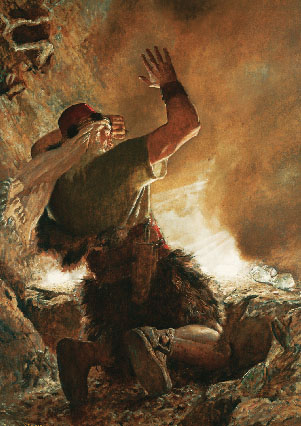
12. How do you explain Ether 3:15 in view of Moses 7:4, which tells of Enoch’s seeing the Lord previously?
a. Enoch saw someone else.
b. The brother of Jared had a better vision than Enoch.
c. The Lord may not have considered Enoch “a man.”
d. One of the passages must be mistaken.
13. Why does it say in Ether 3:24 that the Lord had confounded the language of the Jaredites when it says in 1:35 that he promised not to?
a. Jared broke his promise, so the Lord was no longer obligated.
b. He confounded only their written language but left their spoken language unchanged.
c. He confounded their language uniformly so the Jaredites could understand each other, though others couldn’t understand them.
d. 3:24 tells of a time much later than 1:35 and refers to the normal evolution of language.
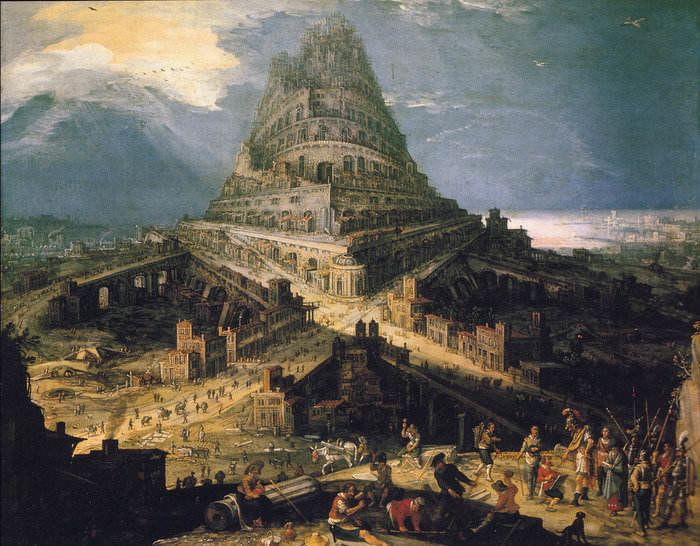
14. The sealed plates of the Book of Mormon evidently contain:
a. A fuller account of the visions of the brother of Jared.
b. More of the words of Christ to the Nephites.
c. The unabridged record from the large plates of Nephi.
d. No one has any idea.
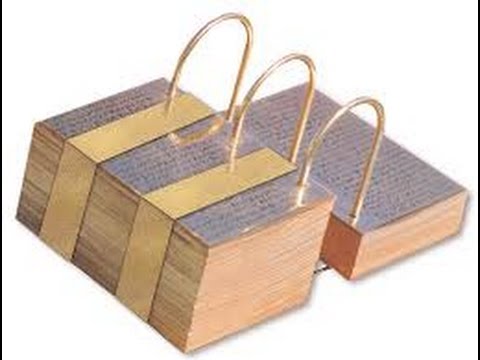
15. According to the Book of Ether (chapter 4), we’ll evidently get the sealed part of the Book of Mormon
a. During the Millennium
b. Any day now.
c. After we’ve studied the unsealed part more thoroughly.
d. When we locate the Urim and Thumim, so we can translate it.
16. What Biblical book does Ether 4 suggest will someday be easier to understand than it is now? a. Genesis b. Isaiah c. John d. Revelation
17. What facet of the restoration of the gospel is predicted in Ether 5?
a. Restoration of the Aaronic Priesthood
b. Coming of Moroni to Joseph Smith
c. Testimony of the Three Witnesses
d. Building of the first latter-day temple
18. Compared to Nephite names, Jaredite names more often
a. End with M rather than N
b. End with N rather than M
c. End with R rather than H
d. End with H rather than R
And what possible importance could the answer have?
19. What other passages in this week’s reading deserve further comment?
Possible Answers to Points to Ponder in Ether 1-5
1. In what way is the very existence of the Book of Ether evidence that Joseph Smith didn’t just make up the Book of Mormon?
If Joseph Smith were making it up, it seems improbable that after having invented the story of the Nephites and miraculously guessing right on so many things related to the culture of the ancient Near East of 600 BC and of ancient America, he would risk being proven a fraud by then gratuitously adding the account of a much earlier civilization, about which far less was known, when later discoveries could demonstrate the deception.
2. Why might we expect the Book of Ether to be in a demonstrably different literary style compared to the books of Mosiah through Mormon 6?
The Book of Ether was abridged by Moroni, whereas the preceding books (through Mormon 6) were abridged by his father, Mormon. Chris Heimerdinger observed that “its literary style is so unique that an honest-minded investigator—even if they remained a skeptic—must dismiss the possibility that the Book of Mormon had a single author. The Book of Ether forces the proposition that, at the very least, a second author was involved. These 15 chapters are too original, too distinct from the rest of the text.” See http://www.bmaf.org/articles/ether_coriantmur__heimerdinger.
3. Ether 1-5 recounts several revelations given to a. Jared b. Moroni c. Ether
d. Mahonri Moriancumr [We know the name of the brother of Jared from a revelation given to Joseph Smith. “Some years after the publication of the Book of Mormon, Joseph Smith was residing in Kirtland, Ohio, when Reynolds Cahoon had a son. One day, when Smith was passing his door, Cahoon called him in and asked Smith to bless and name the baby. Smith did so and gave the boy the name of Mahonri Moriancumer. When Smith finished the blessing, he laid the child on the bed and told Cahoon that the “name I have given your son is the name of the brother of Jared; the Lord has just shown [or revealed] it to me.” (https://en.wikipedia.org/wiki/Brother_of_Jared.) We are uninformed whether or not Reynolds Cahoon ever asked Joseph Smith to bless and name any of his subsequent children!]
4. For what possible reason would the Book of Mormon itself never mention the name of the brother of Jared, when he was quite obviously spiritually superior to Jared?
Quite possibly because the written record of their adventures was kept by Jared and his descendants (Ether 1:6-32), who were most interested in highlighting their own branch of the family. So, if you want your name to be known to future generations, you may wish to do some writing and put your name on it!
5. What was the reason the Lord gave the brother of Jared for which he would take him and his family and friends to a land choice above all others and make of them a great nation?
a. Because of their pre-mortal worthiness
b. Because of his persistence in prayer (Ether 1:43)
c. Because of his exceedingly great faith
d. Because the Americas were empty and needed someone to settle in them
6. “Deseret” is a Jaredite word meaning a. Honeybee (Ether 2:3) b. Industry c. Beehive d. A barren wilderness e. A sweet course eaten at the end of a meal f. A newspaper
7. The Lord chastised the brother of Jared for three hours because he had forgotten a. To pray (Ether 2:14) b. To offer sacrifices c. The twenty-four gold plates d. To bring his wife
How would you summarize the lesson Jared probably hoped we would learn from this?
We must never feel we have had so many spiritual experiences or know so much that we can afford to stop calling on the Lord constantly. Apparently, the brother of Jared got so complacent that he went for four years without praying, even though he had had wonderful revelations from the Lord previously. After enduring three hours of chastisement from the Lord, the brother of Jared presumably never forgot again!
8. The Jaredite barges most closely resembled a a. Rowboat b. Sailboat c. Battleship d. Submarine (Ether 2:17-14)
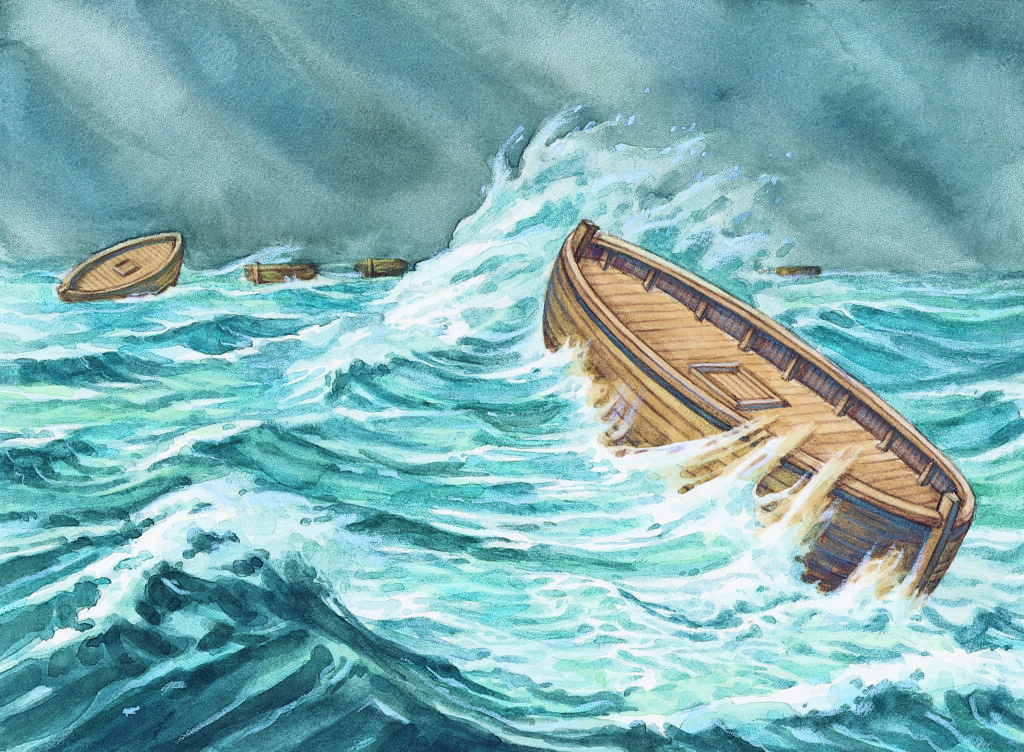
9. When the brother of Jared complained about the lack of light in the barges, the Lord said in effect:
a. Why didn’t you pay your light bill?
b. Go get sixteen stones and let me touch them.
c. I will go before you and be your light.
d. What do you want me to do about it? (Ether 2:23. He wanted the brother of Jared and his associates to take the initiative. The Lord was perfectly ready to help, but he didn’t want Jared’s people to just sit back and wait for the Lord to tell them what to do.)
10. Where might the Brother of Jared have gotten the idea of shining stones to light the barges?
See https://knowhy.bookofmormoncentral.org/knowhy/where-did-the-brother-of-jared-get-the-idea-of-shining-stones and the accompanying video at https://www.youtube.com/watch?v=xscoqV5pSs8&feature=emb_logo for some interesting ideas on the subject.
11. When the Lord touched the brother of Jared’s stones with his finger, the brother of Jared was a. Somewhat annoyed b. Surprised and fearful (Ether 3:6) c. Moved to repentance d. Filled with peace beyond description
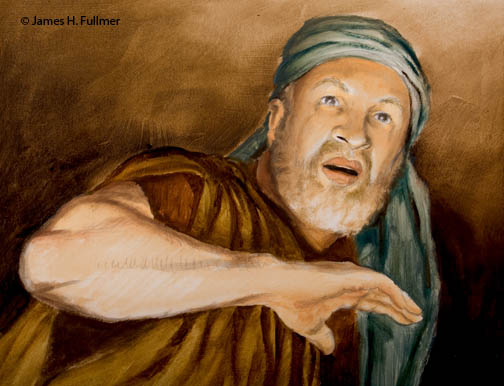
12. How do you explain Ether 3:15 in view of Moses 7:4, which tells of Enoch’s seeing the Lord previously?
a. Enoch saw someone else.
b. The brother of Jared had a better vision than Enoch.
c. The Lord may not have considered Enoch “a man.” [The Lord is quite possibly differentiating here between the natural “man” who doesn’t see divine things and faithful saints like Enoch, Moses, the Brother of Jared, etc., who do. This could be similar to how we might interpret John 1:18, which tells us “No man hath seen God at any time,” although the Bible itself tells us of multiple people who did. Kent P. Jackson analyzes other possible explanations of the Ether 3:15 passage in https://byustudies.byu.edu/content/never-have-i-showed-myself-unto-man-suggestion-understanding-ether-315a.]
d. One of the passages must be mistaken.
13. Why does it say in Ether 3:24 that the Lord had confounded the language of the Jaredites when it says in 1:35 that he promised not to?
a. Jared broke his promise, so the Lord was no longer obligated.
b. He confounded only their written language but left their spoken language unchanged.
c. He confounded their language uniformly so the Jaredites could understand each other, though others couldn’t understand them.
d. 3:24 tells of a time much later than 1:35 and refers to the normal evolution of language.
14. The sealed plates of the Book of Mormon evidently contain:
a. A fuller account of the visions of the brother of Jared. (Ether 4:4)
b. More of the words of Christ to the Nephites.
c. The unabridged record from the large plates of Nephi.
d. No one has any idea.
15. According to the Book of Ether (chapter 4), we’ll evidently get the sealed part of the Book of Mormon
a. During the Millennium (Ether 4:7. Certainly, we don’t expect the Gentiles in general to repent and have faith like the brother of Jared prior to that time.)
b. Any day now.
c. After we’ve studied the unsealed part more thoroughly.
d. When we locate the Urim and Thumim, so we can translate it.
16. What Biblical book does Ether 4 suggest will someday be easier to understand than it is now? a. Genesis b. Isaiah c. John d. Revelation (Ether 4:16)
17. What facet of the restoration of the gospel is predicted in Ether 5?
a. Restoration of the Aaronic Priesthood
b. Coming of Moroni to Joseph Smith
c. Testimony of the Three Witnesses (Ether 5:3)
d. Building of the first latter-day temple
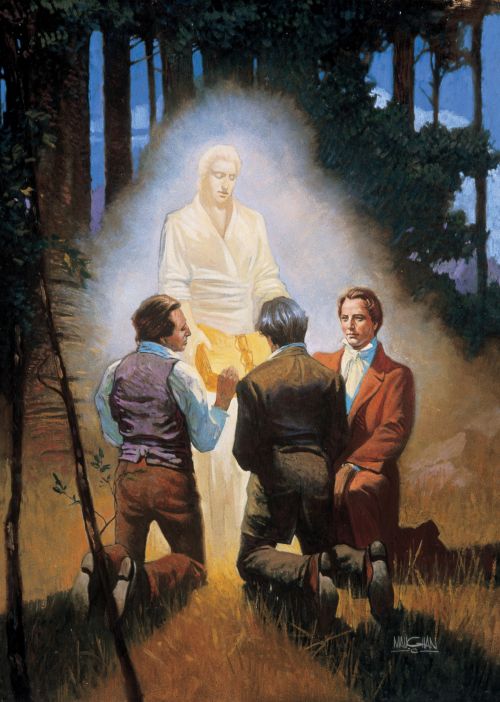
18. Compared to Nephite names, Jaredite names more often
a. End with M rather than N
b. End with N rather than M
c. End with R rather than H
d. End with H rather than R
And what possible importance could the answer have?
This becomes an interesting internal evidence of the authenticity of the Book of Mormon. Noted scholar Hugh Nibley wrote: “Mimation (ending with -m) predominated in Jaredite names, nunation (ending with -n) in Nephite and Lamanite names. This is strictly in keeping with the development of languages in the Old World, where mimation was everywhere succeeded by nunation around 2000 B.C., that is, well after the Jaredites had departed, but long before the Nephites … Mimation was still current in the Semitic dialects of Palestine and Syria between 2100 and 1800 B.C., when the nominative case still ended in -m. From Egyptian and Hittite records it is now clear that the dialects of Palestine and Syria dropped this mimation in the first half of the second millennium B.C., and it is preserved in the Bible only in a few pre-Hebraic words used in very ancient incantations and spells, and in the mysterious and archaic words Urim and Thummim, which it now appears are not Hebrew plurals at all. This is significant, since the Book of Mormon favors -m endings for Jaredite names. The Jaredites must have taken mimation with them some time before 2000 B.C., when the change to nunation occurred. Nunation itself, however, which is extremely common in the Book of Mormon proper names, is an old-fashioned thing which in Lehi’s day was a sign of conservatism and most frequently found among the desert people. It turns up in old Hebrew genealogies in which “the nomenclature is largely un-Hebraic, with peculiar antique formations in -an, -on, and in some cases of particular Arabian origin.” This nunation or ending in -n has left traces in all Semitic languages, but mostly among the desert people, being retained completely in classical Arabic.” (Hugh Nibley, An Approach to the Book of Mormon, available at https://scholarsarchive.byu.edu/cgi/viewcontent.cgi?article=1011&context=mi)
19. What other passages in this week’s reading deserve further comment?
Perhaps the following, among others:
- 2:8-10, 12—the promises of the Lord to this land, conditioned upon righteousness.
- 2:11: Another purpose for the Book of Mormon
- 3:2: Our natures are evil continually.
- 3:16: Similarity between our spirit bodies and our physical bodies.
- 4:11: Believers will be visited with the Spirit to confirm the truthfulness of the message.
- 4:12: Whatever persuades men to do good is of God.
- 4:13: Come to the Lord and He will show the greater things.
- 4:18: The gospel is the same as then—faith, repentance, baptism, etc.
